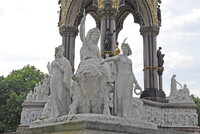| dc.coverage.spatial | Site: London, England, United Kingdom | en_US |
| dc.coverage.temporal | 1863-1876 (creation) | en_US |
| dc.creator | Scott, George Gilbert, I | en_US |
| dc.creator | Armstead, Henry Hugh | en_US |
| dc.creator | Philip, John Birnie | en_US |
| dc.creator | Foley, John Henry | en_US |
| dc.date | 1863-1876 | en_US |
| dc.date.accessioned | 2013-09-16T20:13:01Z | |
| dc.date.available | 2013-09-16T20:13:01Z | |
| dc.date.issued | 1863-1876 | en_US |
| dc.identifier | 234304 | en_US |
| dc.identifier.other | archrefid: 2604 | en_US |
| dc.identifier.uri | http://hdl.handle.net/1721.3/141731 | |
| dc.description | Detail, one of the continent sculpture groups at the outer corners; "The Americas" by John Bell; Commissioned by Queen Victoria in memory of her beloved husband, Prince Albert who died of typhoid in 1861. In 1863 Scott's design for the memorial to Prince Albert in Hyde Park, London, was chosen , but not until 1876 was J. H. Foley’s gilded statue of the Prince finally set in its great Italian Gothic tabernacle [ciborium, derived from the Scaliger Tombs, Verona], enriched by Scott’s favorite craftsmen, including the sculptors Henry Hugh Armstead, John Birnie Philip and J. F. Redfern (1838-1876), the stone-carvers Farmer & Brindley, the ironworker Francis Skidmore and for the mosaics the designer J. R. Clayton (1827-1912) and the maker Antonio Salviati (1816-1890). The central part of the memorial is surrounded by the elaborate sculptural Frieze of Parnassus, which depicts 169 individual composers, architects, poets, painters, and sculptors. Armstead carved the figures on the south and east side, the painters, musicians and poets (80 in total), and grouped them by national schools. John Birnie Philip carved the figures on the west and north side, the sculptors and architects, and arranged them in chronological order. At the corners of the plinth there are two allegorical sculpture programs: four groups depicting Victorian industrial arts and sciences (agriculture, commerce, engineering and manufacturing), and four more groups representing Europe, Asia, Africa and The Americas. Source: Grove Art Online; http://www.oxfordartonline.com/ (accessed 7/18/2012) | en_US |
| dc.format.medium | gilded bronze; marble; enamel and glass mosaic | en_US |
| dc.rights | © Scott Gilchrist, Archivision, Inc. | en_US |
| dc.subject | allegory | en_US |
| dc.subject | decorative arts | en_US |
| dc.subject | human figure | en_US |
| dc.subject | portrait | en_US |
| dc.subject | rulers and leaders | en_US |
| dc.subject | Albert, Prince Consort, consort of Victoria, Queen of Great Britain, 1819-1861 | en_US |
| dc.subject | Nineteenth century | en_US |
| dc.subject | Gothic Revival | en_US |
| dc.title | Albert Memorial | en_US |
| dc.type | image | en_US |
| dc.rights.access | Licensed for educational and research use by the MIT community only | en_US |
| dc.identifier.vendorcode | 1A1-SGG-AM-D10 | en_US |
| vra.culturalContext | British | en_US |
| vra.technique | carving (processes), construction (assembling), mosaic (process), casting (process), metalworking, painting and painting techniques | en_US |
| vra.worktype | sculpture (visual work) | en_US |
| vra.worktype | monument | en_US |
| dc.contributor.display | George Gilbert Scott I (British architect, 1811-1878); Henry Hugh Armstead (British sculptor, 1828-1905); John Birnie Philip (British sculptor, 1824-1875); John Henry Foley (Irish sculptor, 1818-1874) and others | en_US |


